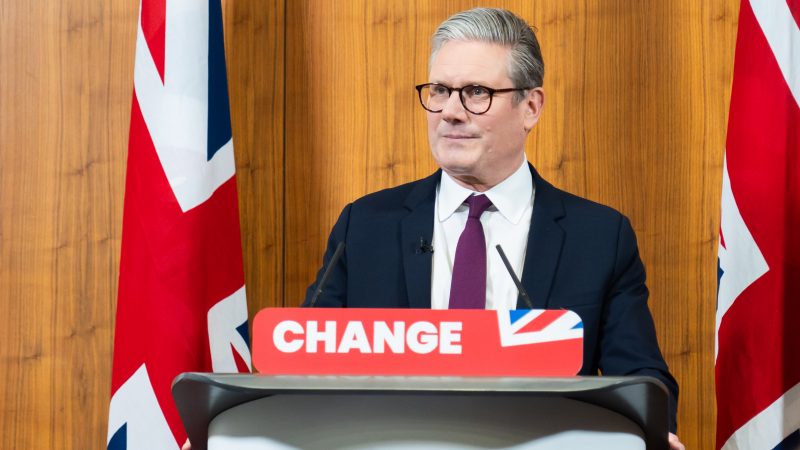
Change. With one simple word the Labour Party managed to capture the mood of the country and with it was swept to power on 4 July in a landslide.
It’s been called a “loveless landslide”. It’s been pointed out the party won 63% of the seats with only 34% of the vote.
But what is indisputable is that the country had had enough of what had come before. The incumbent Conservative Party saw its vote share almost halve, with votes going in all directions. I was lucky enough to be part of this winning campaign (only the third time in our party’s history that we’ve won a majority from Opposition) so I saw it firsthand. The message the electorate delivered was clear.
The Tony Blair Institute recently conducted a survey across a number of countries including the UK which found voters splitting between ‘Insiders’ still backing mainstream politics to work, while ‘Outsiders’ have already given up and are turning to insurgent parties. What unites these two groups is a sense that their country is in decline.
‘People are feeling disconnected from politics’
This presents a mandate for the Labour Party. It shouldn’t be simply policy change that the Government pursues – it should be much more fundamental than that. People are feeling disconnected from politics – turnout fell below 60% in July for the first time since New Labour’s second landslide in 2001 – and disruptor parties on both the left and right of the spectrum are on the rise.
It would be a missed opportunity if we didn’t act on the clamour for change which is clearly being expressed across the country.
Now that the Party is in office, it would be very easy for Labour to fall into the same trap as the Democrats in the United States. Having spent four years (rightly) railing against Donald Trump for breaking norms and pushing the boundaries of their political system, the Democrats ran a campaign in 2020 with Joe Biden at its head aiming to restore normalcy to the White House.
When it office, they became the party of the status quo, preserving norms and institutions the way they’d found them, even when it cost them politically.
When last year’s election was approaching, the Democrats tried the same playbook again, only this time they not only had to swap their figurehead halfway through the campaign, but they also had to abandon their core campaign message because it wasn’t resonating with voters. Why? Because voters frustrated with rising prices and the economic shocks of the last 15 years had had enough of the status quo, and turned to the only candidate that seemed to understand this.
For more from LabourList, subscribe to our daily newsletter roundup of all things Labour – and follow us on Bluesky, WhatsApp, Threads, X or Facebook .
Keir Starmer has come into office off the back of fairly norm-breaking administrations in the UK as well. Boris Johnson with his litany of failures made for a perfect foil for the Labour Leader, as Liz Truss and her Treasury orthodoxy-busting ‘mini-Budget’ did for Rachel Reeves.
In its manifesto and more recently in the Plan for Change document launched before Christmas, the Party positioned itself as the party of norms and institutions – backing economic stability and strengthening the role of the independent Office for Budget Responsibility as two examples.
But the mood in the country isn’t for stability. It’s for change, as we discovered on 4 July. During the campaign, we repeated a mantra that might have worked during the campaign but clearly isn’t resonating with the public now we’re in power.
Our Shadow Cabinet was sent on the airwaves to tell the media and voters that “stability is change”. While it might have been true at the beginning of our time in office, it isn’t enough to convince a sceptical electorate, who have started to move away from us in the polls.
‘Disrupt or be disrupted’
Labour cannot afford to become the party of a failed status quo which was roundly rejected not just in 2024, but also in 2019 and 2016 before that. The Prime Minister has rightly decided to focus to ‘deliverables’.
I started working for the Party as Keir was unveiling his Missions for Government and while there were lots of great policies and targets in there, they weren’t relatable enough to voters’ day-to-day concerns.
That is why the campaign moved to the six First Steps, and while those worked for the campaign, a different tack is needed six months into government. While we shouldn’t endanger the UK economy, we cannot rely purely on rising GDP and living standards to win re-election in 2029.
A more fundamental change is needed, and a few more speeches on economic growth won’t be enough.
Commentators are already saying that a populist wave similar to the second election of Donald Trump could hit Britain when the country next goes to the polls. With Reform UK polling second in a survey towards the end of last year, this idea is gaining traction in the press.
The message to mainstream parties is simple: disrupt or be disrupted.
Speaking of messaging, Nigel Farage’s newish outfit has started using a new three-word slogan to express what they’re about. Having toyed with “Make Britain Great Again” during the leadership of Richard Tice, the party now simply states that “Britain Needs Reform”.
Not only is this a good electoral slogan for a party trying to establish itself nationally, it also happens to be true. In the summer, the Labour Party was able to capture the zeitgeist by advocating ‘Change’ – if it doesn’t show it can really change Britain, then voters might really conclude that Reform is the next best option.
Read more on Rachel Reeves’ growth plans:
- ‘If we ducked tough choices for growth, Britain’s spiral of decline would continue’
- Reeves heads-off southern bias claims with focus on northern investment
- ‘Tearing up regulations or bending the knee to billionaires won’t deliver growth’
- Reeves just gave absent Miliband an airport he wants, not just one he doesn’t
- Heathrow debate: ‘A third runway would shred Britain’s green credibility’
- Heathrow debate: ‘Third runway Labour’s trump card for trade and growth’
- SHARE: If you have anything to share that we should be looking into or publishing about this story – or any other topic involving Labour– contact us (strictly anonymously if you wish) at [email protected].
- SUBSCRIBE: Sign up to LabourList’s morning email here for the best briefing on everything Labour, every weekday morning.
- DONATE: If you value our work, please chip in a few pounds a week and become one of our supporters, helping sustain and expand our coverage.
- PARTNER: If you or your organisation might be interested in partnering with us on sponsored events or projects, email [email protected].
- ADVERTISE: If your organisation would like to advertise or run sponsored pieces on LabourList‘s daily newsletter or website, contact our exclusive ad partners Total Politics at [email protected].





More from LabourList
‘Labour council candidates – it’s tough, but all is not lost’
‘Labour won’t stop the far right by changing leaders — only by proving what the left can deliver’
‘Cutting Welsh university funding would be economic vandalism, not reform’